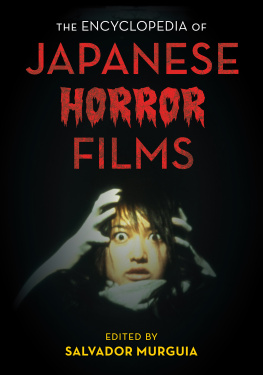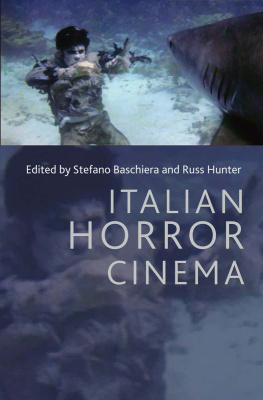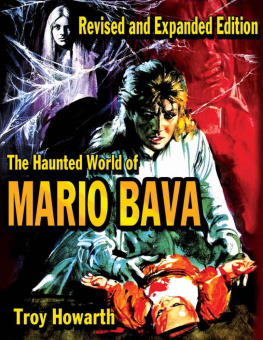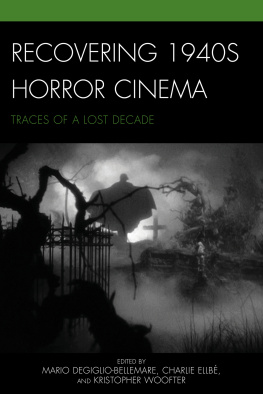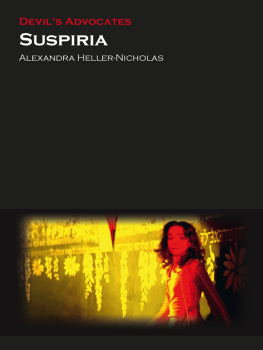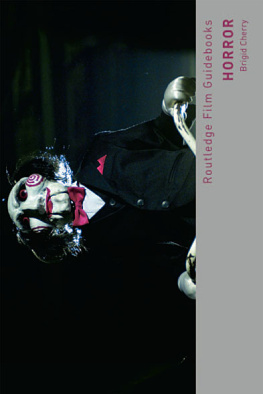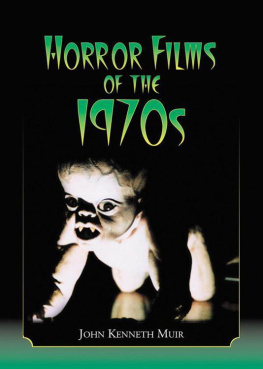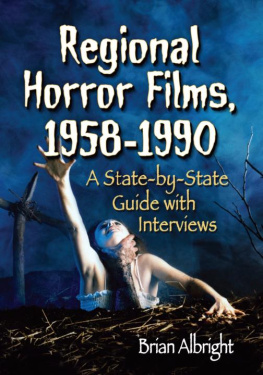Also by LOUIS PAUL
Tales from the Cult Film Trenches: Interviews with 36 Actors from Horror, Science Fiction and Exploitation Cinema(McFarland, 2008)
BY TOM LISANTI AND LOUIS PAUL
Film Fatales: Women in Espionage Films and Television, 19621973(McFarland, 2002)
Italian Horror Film Directors
LOUIS PAUL
with forewords by
JESS FRANCO and ANTONELLA FULCI

McFarland & Company, Inc., Publishers
Jefferson, North Carolina, and London
Except where noted otherwise, all photographs are from the authors collection.
LIBRARY OF CONGRESS CATALOGUING DATA ARE AVAILABLE
BRITISH LIBRARY CATALOGUING DATA ARE AVAILABLE
e-ISBN: 978-0-7864-8749-3
2005 Louis Paul. All rights reserved
No part of this book may be reproduced or transmitted in any form or by any means, electronic or mechanical, including photocopying or recording, or by any information storage and retrieval system, without permission in writing from the publisher.
Cover art by Mark Durr
McFarland & Company, Inc., Publishers
Box 611, Jefferson, North Carolina 28640
www.mcfarlandpub.com
Table of Contents
Foreword
Being, as I am, an absolute fan of American fantasy and horror movies from James Whale and Tod Browning to William Witney and Erle C. Kenton, it is understandable that my favorite Italian movies and directors were never the pretentious works of Luchino Visconti or Federico Fellini or their pupils such as Mario Bolognini or Ettore Scola, but creators in whose films I discovered myself from the times of my childhood, the same feeling that I loved in the old masterpieces from the studios of Universal and Republic.
So when I saw the first Riccardo Freda and Mario Bava horror films, I discovered anew an imagination and a creative world that was more open and free than the American films of that same period. I started to look for other Italian films and directors because I could not believe that Freda and Bava would be two isolated cases in a cinema landscape much too influenced by political or clumsy social messages. In doing so, I found old beautiful films of Carmine Gallone, Mario Camerini, Mario Soldati, Renato Castellani (I consider Un Colpo de Pistola [1941] a masterpiece) and, most of all, Alessandro Blasetti. I have seen the latters La Corona di Ferro (a.k.a. The Iron Crown, with Gino Cervi, Massimo Girotti and Luisa Feridathe lover of Mussolini) at least 20 times. Almost implicit in this film were the elements of the fantastic, erotic and horror-sadisticthe core elements of great Italian films.
Then, after a few years of neo-realism (a very brilliant period, it cannot be denied, but quite far from my personal preferences), the huge industry of the Italian cinema had its golden years and the gateway to imagination swung open again, its pathway, of course, blazed by Bava and Freda.
I started again to love the incredible work of their followers, as Vittorio Cottofavi, Antonio Margheriti, Umberto Lenzi, Lucio Fulci, Dario Argento, Sergio Corbucci, Sergio Solima, Sergio Leone, Fernando Di Leo and hundreds of others invaded the marketplace. Just as in the days of the Old Hollywood, the Italian A & B cinemas grew up together. Those brilliant men, supported by very clever and quick-minded producers, technicians, and actors and actresses, re-invented the Western, the peplum, the horror, the erotic, the thriller, the adventure and the spy films.
For 15 years that splendid machine churned out thousands of films. In reverse flattery, even Hollywood imitated them. Americans came to Almeria, Spain, to shoot their Westerns on the favorite sets of Leone and Corbucci. Unfortunately, this lesson was learned in a very short time of decadence: The Italians had re-invented the cinema and quickly killed it themselves through over-saturation.

Jess Franco (with Lina Romay). Photograph courtesy Kevin Collins.
Now the Italian cinema is almost dead. Only a handful of fairly big and intellectual films supported by the official statementsthe ministries or official television or bothsee the light yearly and, in general, are the kind of prestige films which are not to my personal taste.
Only a few perseveresuch as Argento, Michele Soavi and Tinto Brass. I hope better times will come very soon. I believe in the creativity and strengths of the Italian people. Just look around in the modern American movies and you will find the likes of the Italian-Americans, Martin Scorsese, Abel Ferrara and Quentin Tarantino. Bored of talk shows, contests and series, the Italiansand all of us with themwill search again for a new renaissance of their creative, mad, bold cinema.
Jess Franco
(Jesus Franco Manera)
Fall 2004
Foreword
Italian horror? Whats it all about? In this season of the year, when the distributors put out all that they consider trash stored in their warehouses, there is nothing on the horizon for us gore filmgoers to watch. Italian directors seem to have hidden their horror screenplays in the closet, except for the survivor, Dario Argento, who has released his Il Fantasma dellOpera and Nonhosonno. To refresh the genre, we must look at it with a sense of humor, step back and never forget that nothing can be funnier and more satisfactory than watching a bad horror movie in the right mood with the right company. The magic begins when an absurd plot merges with bad acting and fits perfectly with the inaudible dialogue. In the best case, the director is very concerned about making a serious movie and the result is outstanding nonsense. I used to hear my father, Lucio Fulci, say that horror was not to be taken seriously, being the best escape from real-life cruelty.
Whenever I watch his film Il Cavaliere Costante Nicosia Demoniaco, ovvero: Dracula in Brianza (1975), I see his most personal point of view about the matter. Costante (Lando Buzzanca), after a trip in Romania and a wild party at the weird Count Gradulecus castle, believes hes been bitten by the count. Back in Italy, he gets into every sort of hilarious situation to satisfy his blood thirst. Dad knew how healthy it was to laugh and he laughed til his very last moment. I remember our afternoons together, spent watching Amando De Ossorios saga of the Blind Dead, especially The Cursed Ship (El Buque Maldito [1975]). My father was delighted by both the eccentric costumes and, in the Italian-language version, the outstanding dialogue, written by the now 81-year-old master of the bizarre Renato Polselli. Riti, Magie Nere e Segrete Orge nel Trecento (1972) and La Verit Secondo Satana (1971) were two of Polsellis early 70s flicks. Im very proud I could meet with maestro Polselli once in a while and talk to him. His sense of humor and his peculiar point of view about everything were something that everybody should hear at least once.
With the few recent attempts to give dignity to the genre, it may seem snobbish to give so much attention to movies like the most amusing and stylish Al Festas Fatal Frames (1994), but if the alternative is to watch a sad, pretentious wish I was a Hammer movie film or the usual remake of a remake of a remake of a cult classic, well, I wish that people like Al Festa could shoot a hundred other movies like Fotogrammi Mortali.

Next page

